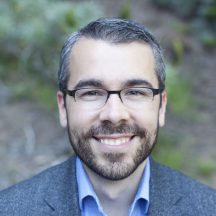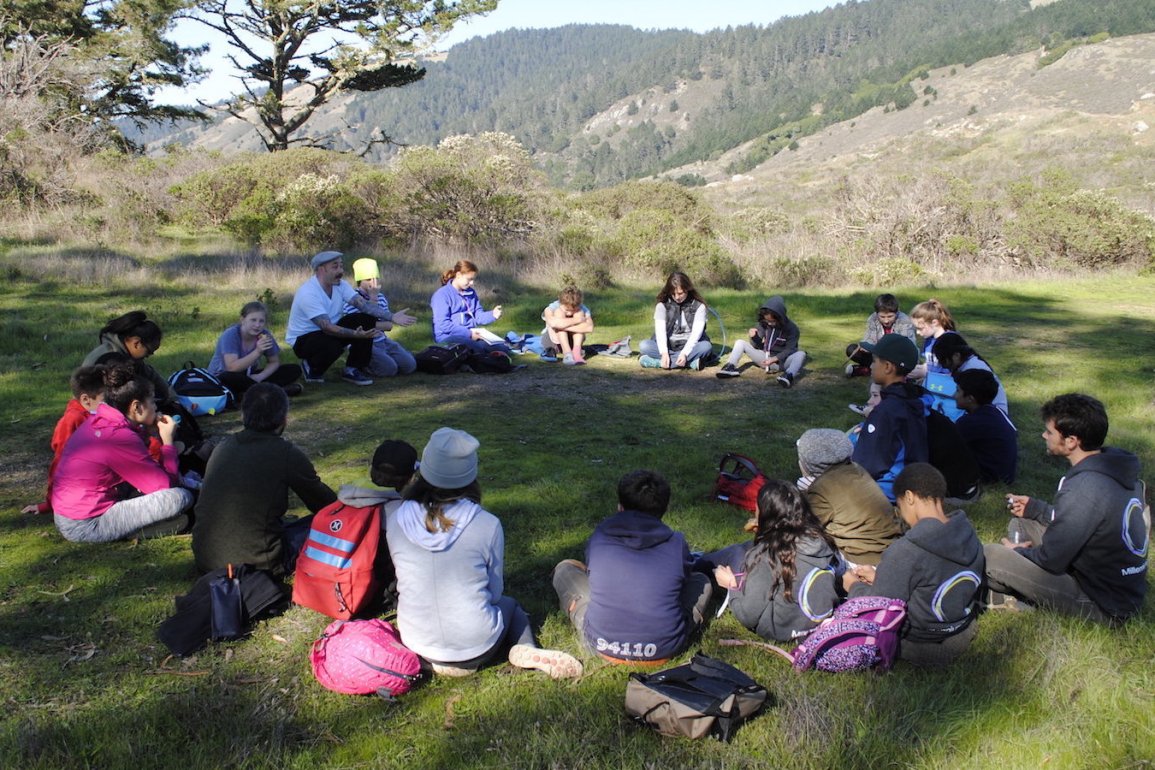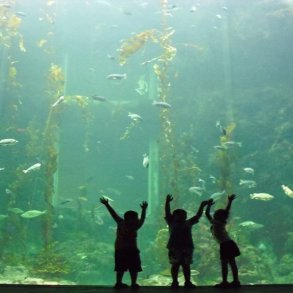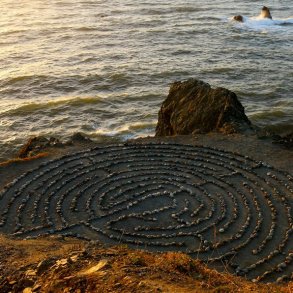By Chris Balme for Enlivening Edge Magazine
Introduction by Jean-Paul Munsch, Guest Editor of EE Magazine’s Education edition:
This article is just: Wow! What a touching story of a school where adults are taking their responsibility to lead adolescents through what some developemental psychologists call one of the biggest crises in an human life. Behind (or above?) the heartwarming story and the clear and precise Teal school concept, there is one thing that struck me most: to see and feel the boldness these adults show to take the lead for what they really want to achieve with their students. And this boldness has genius, power, and magic in it.
The first student, 11 years old, walked very slowly, blindfold securely over her eyes, toes gripping the thin yellow rope as it wound along the forest floor. Then the next, about ten feet behind her, began to do the same. There was a profound silence around them as 20 more followed, underneath a canopy of redwood trees extending far above. They wound around trees and up slopes, each step tentative, sensing everything keenly. Finally, the rope ended, and the students one by one were invited to remove their blindfolds and sit. They found themselves in an ancient redwood grove, trees hundreds of years old around them, and in the center a huge tree stump. On it there sat a man they had never seen before.
This is the adventure of learning.
It springs from playful adults who recognize that they are on a journey, painful at times, delightful at times, growing themselves.
This is a “Teal” school, where our purpose is to develop deeper awareness and consciousness in our students as in ourselves. We’re a new school serving students aged 11-14 in San Francisco, California, called Millennium School. Our aim is to be a laboratory for the development of new learning approaches based on the developmental understanding that informed Frederic Laloux, Ken Wilber, Jenny Wade and others.
This developmental or “evolutionary” idea is the core of our school, informing how we wish to live and act as adults, and how we see our students’ growth. We choose to work with this particular age group because of the intense transformation taking place, as students work to create an identity distinct from their family and in a highly-charged social context. Our research has led us to believe there are three primary developmental stages available to most adolescents, mirroring the progression in Laloux’s work on Teal organizations. Here’s how we explain it:
Imagine you’ve just started a job in a new profession. In the first weeks or months, you might seek first to learn the “rules,” taking guidance received from your manager and colleagues at face value.
Gradually, you become more comfortable, and see the way decisions really get made in the organization. You learn to maneuver your own way. You know what will wow those around you, and you’re becoming more confident in expressing your skills.
Perhaps, as you begin to really settle into the profession over years, you may shift once again. Impressing your colleagues is nice, but you may start to develop your own standards for what your best work looks like. You may see ways to grow, through the company or not, and begin to wonder how to do the work you’re most passionate about, how to keep learning. When you see others wanting to grow as well, you have a natural empathy for them.
In this imaginary example, you’ve just completed a developmental pattern that mirrors what adolescents can go through. From belonging (how do I fit in here, to this group beyond my family?), to achievement (I know how to impress them!), to authenticity (I have the awareness, confidence, and ability to express my gifts). Only for adolescents, they aren’t just learning how to navigate a job, or a school – they’re learning how to navigate life, forming their adult sense of self.
Our aim as a school is to support this evolution, first by modeling an authentic and aware sense of self (in our highly imperfect human ways) and then by creating the right challenges and experiences to help students grow, each at their own pace, in this direction.
The aim is to allow growth to be continual, avoiding the places where it can become stuck if adults are not modeling the next step.
If, for example, a student has been in an achievement-focused stage and the adults around her are modeling achievement as the ultimate goal of life, then the student might stay in that stage indefinitely, missing the search for authenticity and purpose that follows. The key is continual challenge, so that growth continues as the student becomes ready for more. We don’t want to artificially accelerate student’s growth – indeed, we’ve learned that students must enjoy the fruits and perspectives of each stage before they begin to notice its limits.
We’ve created an Adolescent Development Framework that maps these stages, and we hope to evolve this, as open-source, into a tool with detailed markers (ways that we can understand which developmental stage a student is manifesting at present) and challenges (trigger experiences which help them, at the right time, see the path toward growth and evolution to the next stage).
For example, we might sense that a student is stuck in the belonging phase, with a fixed view of right and wrong, by seeing the “marker” that they resist feedback if it goes against the norms of their peer group. In this case, one “challenge” could be to create real-world projects which push them to interact with multiple, high-status leaders who disagree, or who have taken radically different paths to achieve success. If the student is ready, this might help them evolve toward the greater self-agency and appreciation of multiple solution paths which exists in the achievement phase.
Perhaps our most powerful tool to challenge students is what we call Forum, a group process and training in self-awareness. Like an intensive advisory or coaching program, each Forum contains a circle of people who have agreed to help each other grow and to learn tools together, a community of learning and practice.
Each student is in a Forum, and all the full-time adults at the school are in their own Forum as well, meeting monthly for a half-day. In it we learn how to “clear” issues, using tools from Nonviolent Communication and elsewhere; we practice bringing our whole selves to this work by revealing and noticing; and we develop the skills for self-management. Those include the practice of noticing what is emerging on our team at any moment, positive or negative; the work to watch our egos and our tendency to identify strongly with one role or title we may carry; and fundamentally, the aspiration to develop greater acceptance of ourselves and of our colleagues.
Back in that redwood forest, our students began their first Forum experience, as part of the first week of school. On that tree stump they met one of their “guides” for the first time, who introduced them to mindfulness meditation. We didn’t think that 11 year olds could sit for a half-hour in silent meditation in the woods, without training, but they can.
What else can they do in a Teal environment?
We’re eager to discover answers to that question, and to exchange ideas with other educators, parents, and young people on this path. The potential is there. Adolescents are culture-absorbers, soaking in the context and adult modeling around them. As we learn how to model and coach at more advanced stages, we may find that adolescents can build understandings which take adults far longer to develop. The potential is abundant, and we’re grateful for the opportunity to be a “laboratory” exploring these questions.

Chris Balme is the co-founder and Head of School at Millennium School. He and his colleagues invite feedback and ideas as they work to build a laboratory school focused on integral development of each student’s potential. More information at www.millenniumschool.org.




